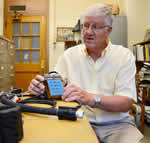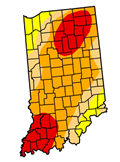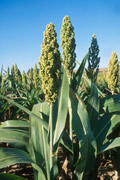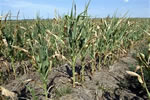 |
![]()
July 2012
From the
Dean
Colleagues,

The forecast is for 105 degrees today as I write this column, so I am fortunate to be inside and typing instead of outside and dealing with record-breaking heat. But the weather will be central to this month’s message. I was planning to write about the 150th anniversary of the Morrill Act, which was signed into law by President Abraham Lincoln on July 2, 1862 and provided the foundation for what we now know as land-grant universities. If you're interested in reading about that topic, you can find the op-ed piece that Purdue College of Engineering Dean Leah Jamieson and I wrote here. Instead, I will focus this month on our College’s response to the Summer 2012 Drought.
I don’t need to say anything more about the weather – everyone in the state knows we are experiencing an extreme drought and torrid heat. Most relate this summer to that of 1988, but without relief soon, the summer of 2012 will be (unfortunately) the new standard of comparison for extreme summer weather. What I will say something about is how Purdue Agriculture is responding. As soon as an incredible spring planting season started to look ‘dry’, our Extension Director Chuck Hibberd convened a group of Extension Specialists and Educators led by Jim Mintert to monitor the weather conditions. This group met regularly and as conditions worsened, their efforts ramped up: press releases and other information were pushed out on everything from weed management and re-plant/double crop decisions, to forage quality, to water management for turf, to impacts of heat on beef production, to taking care of home gardens. When the extreme weather did not let up, on June 28 a comprehensive web resource was released (http://www.purdue.edu/drought), and a 1-888 hotline for questions rolled out.
With no relief in sight, on July 5 our Extension Specialists and Educators convened a news conference at the Normandy Barn on the Indiana State Fairgrounds to help our ag and non-ag media understand the severity of the drought and to begin the process of assessing the implications. Our key partners were there, including Indiana Farm Bureau, the Indiana State Department of Agriculture, the commodity organizations, Farm Service Agency, and the Natural Resources Conservation Service. All of the Indianapolis TV stations were there. So were The Associated Press, some radio networks and virtually all of the Indiana ag media. In addition to the media event, teams of Extension Specialists and Educators worked to lay out action plans for the next steps in terms of our response. I can’t say thanks enough to Jim Mintert, Beth Forbes, Keith Robinson, and everyone involved from Purdue Agriculture, Purdue Extension, Agricultural Communications, and AgIT. Listing everyone involved here is simply not possible – more than 50 were at the State Fair briefing/planning session alone.
I know this heat and lack of rain has implications beyond our Extension efforts: Extension Educators have to address heat-related issues during county fairs; our researchers who have projects at ASREC, ACRE, the PACs, or on Indiana farms must deal with the impacts on their work; farm superintendents worry about safety issues; nervous parents and students at STAR need even more support in heat like this; and I could go on. And, all of this happens on top of the everyday heavy demands over the summer.
A couple of points are very clear: First, this extreme weather is one reason why federal capacity funds and state line-item support are so important. We are able to respond because we have exceptional Extension Specialists and Educators in place, people who have ‘been there before’ and who have conducted research/are familiar with research that will support informed decision-making. We are able to respond because we have our Agricultural Communications unit and the Extension Disaster Education Network in place to help disseminate information in a timely way. All of this is made possible by line-item and capacity funding.
My second and final point is that the College steps up when our stakeholders are in trouble – and they are in trouble this year. I am very proud of the response of our College to this heat and drought, but in no way surprised. We cannot make it rain, nor can we move temperatures out of the triple digits, but we can make research-based insights available in a timely way to help our stakeholders make the very best decisions possible under the circumstances. And, I know we will continue to be there for the people of our state, and the broader region, until this weather breaks.
My thanks again to everyone in the College who is helping us work through the summer of 2012. And, my thanks in advance to everyone who will be involved in the 2012 Indiana State Fair. Hopefully, we will get the ‘State Fair heat’ out of the way in July this year!
All the best,

Purdue Agriculture People
College mourns loss of Dr. Li Fu Chen
 Dr. Li Fu Chen, professor of Food Science, died on June 24 from complications of stomach cancer. Born and raised in Taichung, Taiwan, Dr. Chen studied at National Chung Shin University in Taichung, receiving a bachelor's degree in Soil Science, and in 1968 traveled to the United States to pursue a Masters and PhD in Food Science at the University of Wisconsin, Madison. There he met his wife of 37 years, Vineta, of Beloit, Wisconsin. They married in 1975 and then relocated to West Lafayette where he did post-doctoral research within the Chemical Engineering and Horticulture Departments. Shortly after, he joined the Food Science department as an Assistant Professor. During his 38 years at Purdue, he pioneered research in food bio-processing, most notably developing a method to convert corn biomass to ethanol and other valuable co-products, in an environmentally safe, zero-waste process. Li Fu is survived by his wife Vineta; his children, Stephanie Chen, Julie Chen, and Andrew Chen. He is also survived by his mother Ching Huang; his four brothers, Philip T. Chen, Wen Fu Chen, Wen Hong Chen, and Wen Chin Chen; his sister, Sue Oer Lin; and many loving nieces and nephews, as well as other close relatives in Taiwan.
Dr. Li Fu Chen, professor of Food Science, died on June 24 from complications of stomach cancer. Born and raised in Taichung, Taiwan, Dr. Chen studied at National Chung Shin University in Taichung, receiving a bachelor's degree in Soil Science, and in 1968 traveled to the United States to pursue a Masters and PhD in Food Science at the University of Wisconsin, Madison. There he met his wife of 37 years, Vineta, of Beloit, Wisconsin. They married in 1975 and then relocated to West Lafayette where he did post-doctoral research within the Chemical Engineering and Horticulture Departments. Shortly after, he joined the Food Science department as an Assistant Professor. During his 38 years at Purdue, he pioneered research in food bio-processing, most notably developing a method to convert corn biomass to ethanol and other valuable co-products, in an environmentally safe, zero-waste process. Li Fu is survived by his wife Vineta; his children, Stephanie Chen, Julie Chen, and Andrew Chen. He is also survived by his mother Ching Huang; his four brothers, Philip T. Chen, Wen Fu Chen, Wen Hong Chen, and Wen Chin Chen; his sister, Sue Oer Lin; and many loving nieces and nephews, as well as other close relatives in Taiwan.
Purdue workshop prepares high school teachers, students for global synthetic biology competition
 Thanks to biotechnology and biological engineering professors at Purdue including Jenna Rickus, ABE, several high school students and their teachers are better prepared for the International Genetically Engineered Machines competition on synthetic biology research. More than 40 teams from across the globe will compete in the event, known as iGEM High School, including 30 U.S. teams, seven from Asia and four from Europe. Greenfield (Ind.) Central High School served as host for the international event, which began on June 30. Jenna and Kari Clase of the College of Technology led the BioBuilding 2012 workshop at Purdue in early June, exposing high school teachers and students from Indiana and Kansas to innovative teaching and research techniques in synthetic biology, biotechnology and other areas.
Thanks to biotechnology and biological engineering professors at Purdue including Jenna Rickus, ABE, several high school students and their teachers are better prepared for the International Genetically Engineered Machines competition on synthetic biology research. More than 40 teams from across the globe will compete in the event, known as iGEM High School, including 30 U.S. teams, seven from Asia and four from Europe. Greenfield (Ind.) Central High School served as host for the international event, which began on June 30. Jenna and Kari Clase of the College of Technology led the BioBuilding 2012 workshop at Purdue in early June, exposing high school teachers and students from Indiana and Kansas to innovative teaching and research techniques in synthetic biology, biotechnology and other areas.
Full story: http://www.purdue.edu/newsroom/general/2012/120627ClaseGEM.html
Program at Purdue to train grad students in food security
 Thirty-one graduate students from 19 U.S. universities are gathered at Purdue for two weeks in July to study the array of problems involving world hunger in their quest to develop expertise as tomorrow's leaders in helping to find solutions. The first Borlaug Summer Institute on Global Food Security is being held July 8-20. It is part of a five-year program to train U.S. graduate students in food security and global challenges in sustainable agriculture and related fields such as climate change, water, energy, economics, policy, technology and the environment. The U.S. Borlaug Fellows in Global Food Security program is funded by a $5 million grant from the U.S. Agency for International Development. "The institute targets the brightest graduate students across our nation and sets the stage for them to become the next generation of leaders tasked with tackling global hunger," said Gary Burniske, managing director of the Purdue Center for Global Food Security, which will conduct the program annually.
Thirty-one graduate students from 19 U.S. universities are gathered at Purdue for two weeks in July to study the array of problems involving world hunger in their quest to develop expertise as tomorrow's leaders in helping to find solutions. The first Borlaug Summer Institute on Global Food Security is being held July 8-20. It is part of a five-year program to train U.S. graduate students in food security and global challenges in sustainable agriculture and related fields such as climate change, water, energy, economics, policy, technology and the environment. The U.S. Borlaug Fellows in Global Food Security program is funded by a $5 million grant from the U.S. Agency for International Development. "The institute targets the brightest graduate students across our nation and sets the stage for them to become the next generation of leaders tasked with tackling global hunger," said Gary Burniske, managing director of the Purdue Center for Global Food Security, which will conduct the program annually.
Full story: http://www.purdue.edu/newsroom/outreach/2012/120629BurniskeInstitute.html
Call for nominations--Agriculture Alumni awards
The College of Agriculture and the Purdue Agricultural Alumni Association invite you to submit nominations for our 2013 awards programs. We have two major awards that encompass all of our disciplines: the College’s Distinguished Agriculture Alumni (DAA) and the Ag Alumni Association’s Certificate of Distinction (CD). Please feel free to forward this information to anyone who may be interested in submitting a nomination.
Click here for specific information and criteria for these two awards. All nomination materials and award descriptions, as well as lists of past winners, can be accessed at www.ag.purdue.edu/agalumni/pages/awards.aspx.
Awards and Recognitions
 Layi Adeola, Animal Sciences, will be honored with the 2012 Broiler Research Award on July 12 at the annual Poultry Science Meeting awards banquet in Athens, Georgia. This prestigious award, sponsored by the National Chicken Council, is given for distinctive research that has a strong economic impact on the broiler industry. Dr. Adeola’s research, focusing on amino acid nutrition in poultry and other nonruminants, has provided worldwide impacts towards maximizing food animal production while minimizing environmental impacts.
Layi Adeola, Animal Sciences, will be honored with the 2012 Broiler Research Award on July 12 at the annual Poultry Science Meeting awards banquet in Athens, Georgia. This prestigious award, sponsored by the National Chicken Council, is given for distinctive research that has a strong economic impact on the broiler industry. Dr. Adeola’s research, focusing on amino acid nutrition in poultry and other nonruminants, has provided worldwide impacts towards maximizing food animal production while minimizing environmental impacts.
 Professor Gary Krutz, ABE: The LifeSense Hydraulic Hose Condition Monitoring System has been selected by an independent judging panel and the editors of R&D Magazine as a recipient of a 2012 R&D 100 Award. This award recognizes the 100 most technologically significant products introduced in the past year. The R&D 100 Awards have long been a benchmark of excellence for industry sectors as diverse as telecommunications, high-energy physics, software, manufacturing, and biotechnology.
Professor Gary Krutz, ABE: The LifeSense Hydraulic Hose Condition Monitoring System has been selected by an independent judging panel and the editors of R&D Magazine as a recipient of a 2012 R&D 100 Award. This award recognizes the 100 most technologically significant products introduced in the past year. The R&D 100 Awards have long been a benchmark of excellence for industry sectors as diverse as telecommunications, high-energy physics, software, manufacturing, and biotechnology.
 Gerald Shiveley, AGEC, was selected by the Provost as one of six 2012-13 Fellows of the Committee on Institutional Cooperation Academic Leadership Program (CIC-ALP). The CIC-ALP is designed to develop the leadership and managerial skills of faculty who have demonstrated exceptionally ability and administrative promise. It is specifically oriented to the challenges of academic administration of major research universities and to the preparation of faculty members to meet those challenges. The CIC is an academic consortium of Big Ten universities and the University of Chicago.
Gerald Shiveley, AGEC, was selected by the Provost as one of six 2012-13 Fellows of the Committee on Institutional Cooperation Academic Leadership Program (CIC-ALP). The CIC-ALP is designed to develop the leadership and managerial skills of faculty who have demonstrated exceptionally ability and administrative promise. It is specifically oriented to the challenges of academic administration of major research universities and to the preparation of faculty members to meet those challenges. The CIC is an academic consortium of Big Ten universities and the University of Chicago.
 Allen Talbert, YDAE, was selected as the Region IV winner in the Outstanding Cooperation award at the National Association of Agricultural Educators conference in Hannibal, Missouri in June. Dr. Talbert will receive his award this fall at the NAAE Convention in Atlanta, Georgia.
Allen Talbert, YDAE, was selected as the Region IV winner in the Outstanding Cooperation award at the National Association of Agricultural Educators conference in Hannibal, Missouri in June. Dr. Talbert will receive his award this fall at the NAAE Convention in Atlanta, Georgia.
 Inez Ponce de Leon, YDAE, received the Outstanding Dissertation Award at the ACE conference in Annapolis, MD. Inez’s dissertation was titled “Science Communication Beliefs of Researchers Based in the Philippines and the United States: A Qualitative Analysis of Research Cultures and Worldviews." Inez completed her doctoral degree under the direction of Drs. Mark Tucker and Allen Talbert.
Inez Ponce de Leon, YDAE, received the Outstanding Dissertation Award at the ACE conference in Annapolis, MD. Inez’s dissertation was titled “Science Communication Beliefs of Researchers Based in the Philippines and the United States: A Qualitative Analysis of Research Cultures and Worldviews." Inez completed her doctoral degree under the direction of Drs. Mark Tucker and Allen Talbert.
Purdue Agriculture in the News
Purdue Extension starts website for information on drought
 Purdue Extension has created a website that provides information and resources to help farmers, homeowners and community leaders manage issues involving the worsening drought in Indiana. The site, called IN Drought, can be found at http://www.purdue.edu/drought. It offers an array of information for anyone seeking guidance to help them through this period of extreme heat and dryness. In addition to the latest news on the drought, the site contains numerous links to Extension publications and other websites that offer tips to homeowners and other consumers on such topics as how to keep garden plants healthy, protect lawns, conserve water and avoid heat stress. Community leaders will have quick access to information on burn bans, including a map of Indiana showing the status of restrictions in each county and other information they can share in their communities, such as advice on fireworks safety. Farmers will see links to Purdue websites with resources they can use to help them in their operations affected by drought. The Indiana map of the latest U.S. Drought Monitor, showing the severity of dryness in each county, is displayed on the home page.
Purdue Extension has created a website that provides information and resources to help farmers, homeowners and community leaders manage issues involving the worsening drought in Indiana. The site, called IN Drought, can be found at http://www.purdue.edu/drought. It offers an array of information for anyone seeking guidance to help them through this period of extreme heat and dryness. In addition to the latest news on the drought, the site contains numerous links to Extension publications and other websites that offer tips to homeowners and other consumers on such topics as how to keep garden plants healthy, protect lawns, conserve water and avoid heat stress. Community leaders will have quick access to information on burn bans, including a map of Indiana showing the status of restrictions in each county and other information they can share in their communities, such as advice on fireworks safety. Farmers will see links to Purdue websites with resources they can use to help them in their operations affected by drought. The Indiana map of the latest U.S. Drought Monitor, showing the severity of dryness in each county, is displayed on the home page.
Nielsen: Indiana drought worst on crop conditions since 1988
 Indiana crop conditions continue to deteriorate daily as the drought worsens to a level not seen since 1988, Purdue Extension corn specialist Bob Nielsen said at Purdue Agriculture's drought information news conference on July 5. The state’s corn crop has fallen off such that only 19 percent was rated good to excellent by the U.S. Department of Agriculture. As of July 1, more than 90 percent of the crop acres were rated as short to very short for soil moisture. As a majority of the corn crop enters the crucial and sensitive pollination period, there is little chance for recovery, Nielsen said. Without rain and cooler temperatures, he said, corn could lose up to 10 percent yield potential daily. “A break in the drought and heat for the remainder of the season would certainly minimize further deterioration of the corn crop but would not result in recovery to anywhere close to normal yields,” he said.
Indiana crop conditions continue to deteriorate daily as the drought worsens to a level not seen since 1988, Purdue Extension corn specialist Bob Nielsen said at Purdue Agriculture's drought information news conference on July 5. The state’s corn crop has fallen off such that only 19 percent was rated good to excellent by the U.S. Department of Agriculture. As of July 1, more than 90 percent of the crop acres were rated as short to very short for soil moisture. As a majority of the corn crop enters the crucial and sensitive pollination period, there is little chance for recovery, Nielsen said. Without rain and cooler temperatures, he said, corn could lose up to 10 percent yield potential daily. “A break in the drought and heat for the remainder of the season would certainly minimize further deterioration of the corn crop but would not result in recovery to anywhere close to normal yields,” he said.
Full story: http://www.purdue.edu/newsroom/outreach/2012/120705HurtDrought.html
Researchers: Sorghum should be in the mix as a biofuel crop
 Sweet and biomass sorghum would meet the need for next-generation biofuels to be environmentally sustainable, easily adopted by producers and take advantage of existing agricultural infrastructure, according to a group of researchers led by Drs. Nick Carpita, Botany and Plant Pathology and Cliff Weil, Agronomy. The scientists from Purdue, the University of Nebraska-Lincoln, University of Illinois and Cornell University believe sorghum, a grain crop similar to corn, could benefit from the rail system, grain elevators and corn ethanol processing facilities already in place. Their perspective article was published online in the journal Biofuels, Bioproducts & Biorefining. "The Midwest is uniquely poised to get the biorefining industry going on cellulose," said Nick Carpita, a Purdue professor of botany and plant pathology. "As we move to different fuels beyond ethanol, the ethanol plants of today are equipped to take advantage of new bioenergy crops." The scientists argue that no single plant is a silver-bullet answer to biofuels, but sorghum should be a larger part of the conversation than it is today.
Sweet and biomass sorghum would meet the need for next-generation biofuels to be environmentally sustainable, easily adopted by producers and take advantage of existing agricultural infrastructure, according to a group of researchers led by Drs. Nick Carpita, Botany and Plant Pathology and Cliff Weil, Agronomy. The scientists from Purdue, the University of Nebraska-Lincoln, University of Illinois and Cornell University believe sorghum, a grain crop similar to corn, could benefit from the rail system, grain elevators and corn ethanol processing facilities already in place. Their perspective article was published online in the journal Biofuels, Bioproducts & Biorefining. "The Midwest is uniquely poised to get the biorefining industry going on cellulose," said Nick Carpita, a Purdue professor of botany and plant pathology. "As we move to different fuels beyond ethanol, the ethanol plants of today are equipped to take advantage of new bioenergy crops." The scientists argue that no single plant is a silver-bullet answer to biofuels, but sorghum should be a larger part of the conversation than it is today.
Full story: http://www.purdue.edu/newsroom/research/2012/120619CarpitaSorghum.html
Drought could cost farmers with future delivery contracts
 Drought conditions could hit Indiana farmers in the pocketbook in more ways than one, Purdue Extension agricultural economist Chris Hurt says. Not only could water-starved corn and soybean crops produce smaller yields and cut into farmers' revenues, but they also could force some growers who signed future delivery contracts with grain buyers to buy back some bushels they are unable to supply, Hurt said. "We've been hearing of producers calling their grain managers and talking with them about the possibilities of dealing with these yield reductions," Hurt said. "Right now it's hard to say what will happen because nobody knows where grain prices are going to go." With some parts of Indiana now nearing a month without significant rainfall and the critical pollination phase of corn either already started or about to begin, large crop losses appear likely for some farmers. Those losses would be especially painful for farmers who sold a large percentage of their anticipated corn crop this spring in forward cash contracts.
Drought conditions could hit Indiana farmers in the pocketbook in more ways than one, Purdue Extension agricultural economist Chris Hurt says. Not only could water-starved corn and soybean crops produce smaller yields and cut into farmers' revenues, but they also could force some growers who signed future delivery contracts with grain buyers to buy back some bushels they are unable to supply, Hurt said. "We've been hearing of producers calling their grain managers and talking with them about the possibilities of dealing with these yield reductions," Hurt said. "Right now it's hard to say what will happen because nobody knows where grain prices are going to go." With some parts of Indiana now nearing a month without significant rainfall and the critical pollination phase of corn either already started or about to begin, large crop losses appear likely for some farmers. Those losses would be especially painful for farmers who sold a large percentage of their anticipated corn crop this spring in forward cash contracts.
Full story: http://www.purdue.edu/newsroom/outreach/2012/120627HurtDrought.html
New CFO and CAFO rules require operational changes
 Indiana's new regulations aimed at keeping confined animal feeding operations environmentally friendly require producers to change record-keeping and manure management practices, effective July 1. Last fall, the Indiana Department of Environmental Management approved revised rules that altered the environmental management requirements of confined feeding operations (CFOs) and concentrated animal feeding operations (CAFOs). Under the new rules, CAFOs have the option to continue to have CAFO permits or assume general CFO permit status, said Purdue Extension nutrient management specialist Tamilee Nennich, Animal Sciences. Operations that would like to maintain their CAFO permits will need individualized permits approved by IDEM.
Indiana's new regulations aimed at keeping confined animal feeding operations environmentally friendly require producers to change record-keeping and manure management practices, effective July 1. Last fall, the Indiana Department of Environmental Management approved revised rules that altered the environmental management requirements of confined feeding operations (CFOs) and concentrated animal feeding operations (CAFOs). Under the new rules, CAFOs have the option to continue to have CAFO permits or assume general CFO permit status, said Purdue Extension nutrient management specialist Tamilee Nennich, Animal Sciences. Operations that would like to maintain their CAFO permits will need individualized permits approved by IDEM.
Full story: http://www.purdue.edu/newsroom/outreach/2012/120627NennichCFO.html
Drought season highlights damage caused by nematodes
 The drought throughout Indiana is intensifying nematode damage in farm fields, says Purdue Extension nematologist Jamal Faghihi, Entomology. The needle nematode, soybean cyst nematode and lance nematode all are causing more problems for grain farmers in a year when crops already are stressed by extreme heat and lack of rain. Faghihi explained that nematodes, microscopic roundworms, can be found in fields every year, but the damage is worse during a drought season. "The severity of symptoms shows because of the stress in plants," he said. Farmers should know if they are having nematode problems at this point in the summer. "They've always been there if you looked hard enough," Faghihi said. "Now, you can't miss it."
The drought throughout Indiana is intensifying nematode damage in farm fields, says Purdue Extension nematologist Jamal Faghihi, Entomology. The needle nematode, soybean cyst nematode and lance nematode all are causing more problems for grain farmers in a year when crops already are stressed by extreme heat and lack of rain. Faghihi explained that nematodes, microscopic roundworms, can be found in fields every year, but the damage is worse during a drought season. "The severity of symptoms shows because of the stress in plants," he said. Farmers should know if they are having nematode problems at this point in the summer. "They've always been there if you looked hard enough," Faghihi said. "Now, you can't miss it."
Full story: http://www.purdue.edu/newsroom/outreach/2012/120703FaghihiNematodes.html
Adoption of advanced techniques could propel crop improvement
 Scientists could take greater strides toward crop improvement if there were wider adoption of advanced techniques used to understand the mechanisms that allow plants to adapt to their environments, current and former Purdue University researchers say. In a perspective for the journal Science, Brian Dilkes, Horticulture and Landscape Architecture, and Ivan Baxter, a research computational biologist for the U.S. Department of Agriculture's Agricultural Research Service, argue that today's technology could allow scientists to match physiological and genetic characteristics of plants with the soil characteristics that promote or inhibit their growth. Making those connections could reduce the time necessary to improve plants that are coping with changing environmental and climatic conditions.
Scientists could take greater strides toward crop improvement if there were wider adoption of advanced techniques used to understand the mechanisms that allow plants to adapt to their environments, current and former Purdue University researchers say. In a perspective for the journal Science, Brian Dilkes, Horticulture and Landscape Architecture, and Ivan Baxter, a research computational biologist for the U.S. Department of Agriculture's Agricultural Research Service, argue that today's technology could allow scientists to match physiological and genetic characteristics of plants with the soil characteristics that promote or inhibit their growth. Making those connections could reduce the time necessary to improve plants that are coping with changing environmental and climatic conditions.
Full story: http://www.purdue.edu/newsroom/research/2012/120628DilkesScience.html
Butterflies to be counted, photographed at annual Encounter
 Butterfly enthusiasts of all ages can learn about identifying, protecting and photographing regional butterflies at the annual Tippecanoe County Butterfly Encounter. The Encounter will be from 10 a.m. to 3 p.m. July 21 at the Evonik Degussa Wildlife Habitat Area, 1650 Lilly Road, Lafayette. The morning session will feature an insect photography workshop led by photography consultant Gene White, an alumnus of the Purdue University Department of Entomology. The workshop is designed for novice to intermediate photographers and includes instruction and practice time.
Butterfly enthusiasts of all ages can learn about identifying, protecting and photographing regional butterflies at the annual Tippecanoe County Butterfly Encounter. The Encounter will be from 10 a.m. to 3 p.m. July 21 at the Evonik Degussa Wildlife Habitat Area, 1650 Lilly Road, Lafayette. The morning session will feature an insect photography workshop led by photography consultant Gene White, an alumnus of the Purdue University Department of Entomology. The workshop is designed for novice to intermediate photographers and includes instruction and practice time.
Full story: http://www.purdue.edu/newsroom/events/2012/120709ShepsonButterfly.html
Glyphosate-resistant weeds found in multiple Indiana counties
 As the summer drought continues, farmers across Indiana are struggling to control glyphosate-resistant weeds, says a Purdue Extension specialist Bill Johnson, Botany and Plant Pathology. Farmers are seeing marestail, giant ragweed and common waterhemp throughout their fields this year, and the hot, dry weather is making it more difficult to get a firm grip on controlling them. According to Johnson, marestail and giant ragweed are spread widely around the state. Waterhemp is mainly seen in southwest, northwest and east-central Indiana and glyphosate-resistant populations have now been confirmed in nine counties. Glyphosate-resistant Palmer amaranth has been confirmed in one county. Although glyphosate-resistant marestail is the primary concern in 2012 and can be found in most counties where soybeans are grown, waterhemp and giant ragweed are of growing importance.
As the summer drought continues, farmers across Indiana are struggling to control glyphosate-resistant weeds, says a Purdue Extension specialist Bill Johnson, Botany and Plant Pathology. Farmers are seeing marestail, giant ragweed and common waterhemp throughout their fields this year, and the hot, dry weather is making it more difficult to get a firm grip on controlling them. According to Johnson, marestail and giant ragweed are spread widely around the state. Waterhemp is mainly seen in southwest, northwest and east-central Indiana and glyphosate-resistant populations have now been confirmed in nine counties. Glyphosate-resistant Palmer amaranth has been confirmed in one county. Although glyphosate-resistant marestail is the primary concern in 2012 and can be found in most counties where soybeans are grown, waterhemp and giant ragweed are of growing importance.
Full story: http://www.purdue.edu/newsroom/outreach/2012/120706JohnsonGlyphosate.html
University News
Applications, nominations sought for Honors College associate dean position
The search committee for the position of associate dean for academic affairs within Purdue's Honors College is accepting applications and nominations. Details about the position are available in a PDF file
Excited about a cloudy future at Purdue: University and EMC bringing massive data storage to students and faculty
Comedian George Carlin famously observed that all you need in life is a place to put your stuff. For college students, where to put their digital stuff, including materials developed through their academic careers, their many favorite photos, and a multitude of other digital files, can be a problem. It's an even bigger problem for researchers and instructors who may have enormous data files that need to be managed, curated and analyzed. A new service at Purdue, however, called BoilerBackpack, will give students, faculty and staff 100 gigabytes of personal storage, so everyone at Purdue will have a large amount of space to store their digital stuff. And that's just the first step in a new partnership between Purdue and storage giant EMC Corp.
Full story: http://www.purdue.edu/newsroom/general/2012/120627McCartneyEMC.html
New Policy Guidelines Established for Per Diem Rates While on University Business
The Travel Department has revised two travel policies regarding per diem payments while on University business. The changes align Purdue’s travel policy with the United States General Services Administration guidelines and Purdue’s peer institutions. Both changes go into effect for travel on or after July 1.
Full story: http://www.purdue.edu/business/bpnews/News_Releases/Travel/General_Info/newPolicyGuidelinesEstablished.html
Mark Your Calendar
Check the College online calendar for all events, seminars and deadlines here: http://www.ag.purdue.edu/Lists/Agriculture%20Calendar/calendar.aspx